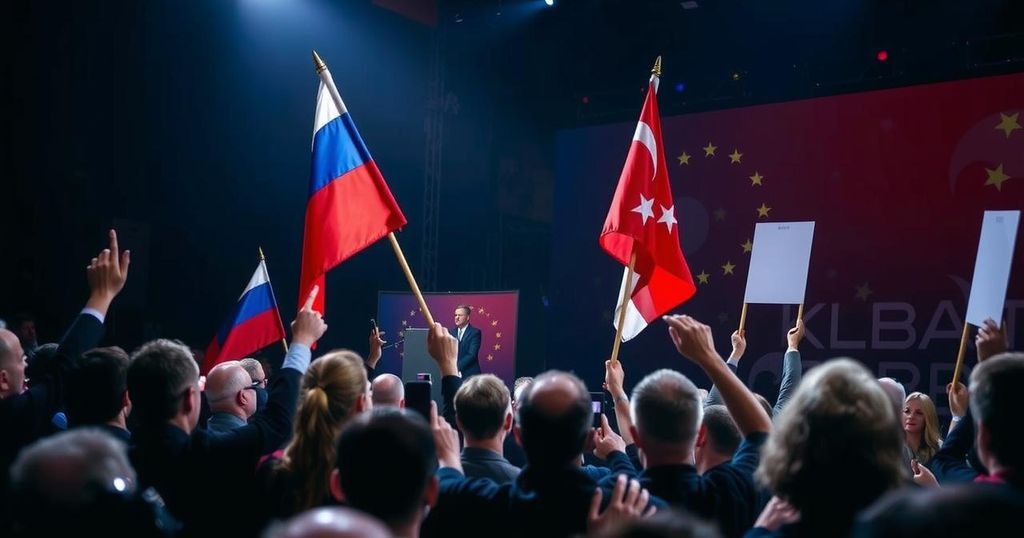Both Sides Claim Victory in Georgia’s Crucial Election for European Future

In Georgia’s pivotal election, both the ruling Georgian Dream party and opposition factions claim victory amid high voter turnout, allegations of violence, and electoral discrepancies. Exit polls suggest overall support is split between the parties, with varying results. The stakes reflect the nation’s choice between European integration and Russian influence, amidst accusations of interference and violations during the electoral process.
In a critical election that could determine Georgia’s alignment with Europe, both the ruling Georgian Dream party and the opposition factions claim to have emerged victorious according to competing exit polls. The exit polls show divergent results regarding the potential for forming a governing majority, with the Georgian Dream party, led by billionaire Bidzina Ivanishvili, projected to attain a significant share of the vote, albeit challenged by the opposition’s assertion of a combined majority. High voter turnout was reported in this South Caucasian nation, yet the day was marred by multiple allegations of electoral violations and violence, including an incident where two individuals were hospitalized following confrontations involving party supporters. An opposition official recounted being assaulted by members of the ruling party, stating, “I was beaten up first by a local Georgian Dream councillor, and then another 10 men came and I didn’t know what was happening to me.” The stakes in this election are deemed substantial, representing a choice between alignment with European values versus Russian influence. According to an opposition voter, this election could signify a pivotal moment for the nation. Exit polls indicated that Georgian Dream received approximately 40.9% of the votes, while the combined opposition might achieve around 51.9%. Government-affiliated media reported even higher support for Georgian Dream at 56%. Despite being designated a candidate for EU membership in December, Georgia’s accession process has been halted due to perceived democratic setbacks, particularly a controversial law regarded as inheriting Russian influence. Ivanishvili’s increasingly anti-Western rhetoric adds to concerns that a Georgian Dream victory could reorient the country closer to Russia amidst a backdrop of historic tensions. Voters were presented with a dichotomy: supporting a government that purportedly serves its citizens or siding with what Ivanishvili has termed “foreign agents” of influence. One voter expressed concerns for future generations, prioritizing peace over geopolitical uncertainties. “The most important thing – for me, my family, my grandchildren – is peace that I wish for all Georgians,” they remarked. Observers reported irregularities such as ballot stuffing and voter intimidation, prompting President Salome Zourabichvili’s pleas for opposition supporters to resist intimidation, advising them that it was mere psychological warfare. Furthermore, there were claims of violence directed at opposition members by Georgian Dream affiliates during attempts to monitor the election process. As the election unfolded, a Georgian monitoring group highlighted alleged disinformation efforts perpetrated by Russian entities aimed at influencing public perception. The Kremlin, however, denies any allegations of interference in Georgia’s political landscape, instead accusing Western nations of attempting to destabilize the region.
The significance of this election stems from Georgia’s precarious position between European aspirations and the influence of Russia, a historical adversary. Georgia was granted candidate status for EU membership, but this process faced setbacks due to issues of democratic integrity, particularly in light of proposed laws reflecting Russian governance patterns. The political climate is characterized by a divide between pro-Western opposition groups seeking reform and a ruling party that has maintained power for over a decade, invoking national stability and pragmatic relations with Russia in its campaign rhetoric.
The electoral contest in Georgia underscores the nation’s ongoing struggle to define its identity and future alignment, either as a European-oriented state or a Russian satellite. With allegations of electoral malfeasance and violence overshadowing the voting process, the outcome remains contentious. Both major political factions assert their claim to victory, setting the stage for further disputes over legitimacy and governance.
Original Source: www.bbc.com








